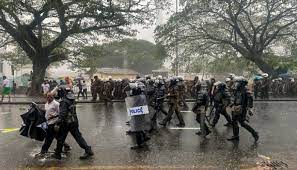COLOMBO (AFP): Bankrupt Sri Lanka is set to postpone local elections due next month, according to a top official, prompting opposition protests on Tuesday that forced parliament to be adjourned.
The March 9 vote was meant to be a key test of support for President Ranil Wickremesinghe, who took office in July after months of protests over a dire economic crisis.
According to a court submission by the Election Commission, the treasury has refused to fund the printing of ballot papers, fuel or police protection for polling booths.
“I had given an undertaking to the Supreme Court recently that the poll will be held on time,” Election Commission chief Nimal Punchihewa told AFP.
“But, I am now informing court that we won’t be able to do it because the government is not releasing the necessary funds.”
The president previously said elections were impossible as state revenue was insufficient to pay salaries, pensions and maintain essential services.
Wickremesinghe, who replaced Gotabaya Rajapaksa after protesters stormed the presidential palace, has implemented swingeing tax hikes and price rises in an effort to secure a bailout from the International Monetary Fund.
Parliament was adjourned Tuesday after opposition MPs carried placards to protest against what they said was a government attempt to avoid voter scrutiny and cling to power.
“The government is using the economic crisis to suppress democracy and sabotage elections,” opposition MP Wimal Weerawansa said.
Sri Lanka’s top court is expected to make a ruling on Thursday but it is unclear whether the government would have the cash to proceed even if the judge orders the polls go ahead.
The vote has been estimated to cost about 10 billion rupees ($27.6 million).
Sri Lanka, home to around 22 million people, has seen more than a year of acute shortages of essentials along with hyper-inflation, and in April defaulted on its $46 billion external debt.
Wickremesinghe, 73, won a parliamentary vote to replace Rajapaksa with the backing of Rajapaksa’s SLPP party, but has no popular mandate.
At the last local elections in 2018, his United National Party won just 10 percent of the 340 councils, while conceding 231 to the SLPP.
The IMF previously said its $2.9 billion rescue depends on Sri Lanka’s bilateral creditors — including China — agreeing to restructure their debts.
But the global lender is now considering approving the bailout without a formal assurance from China, under a rarely used policy on lending into official arrears, Bloomberg News reported on Friday.
China, the nation’s biggest bilateral creditor, has so far offered only a two-year moratorium on debt repayments, Sri Lankan government spokesman Bandula Gunawardana told reporters Tuesday.







